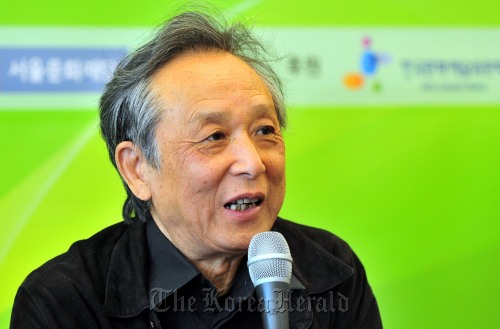Chinese-born Nobel Prize winner says modern literature must break away from 20th-century ideologies
Gao Xingjian, the Chinese-born recipient of the 2000 Nobel Prize in Literature, said all forms of literature must be free from outside control, including ideologies, politics, and the free market.
He was speaking at a press conference Tuesday at Kyobo Bookstore in downtown Seoul, on the first day of the third Seoul International Forum for Literature. It is his first visit to Korea.
“I’ve always been a firm believer that literature should be free from politics and the market influence,” Gao told reporters. “After globalization, especially, the free market and its value have been dominating the globe. As a result, literature has become something to be consumed. For this forum, I’d like to discuss how literature and writers can obtain independence in today’s world.”
Born in 1940 in Jianxi, China, Gao is the first Chinese-born writer to win the Nobel Prize. Frustrated with the Chinese authorities that did not allow freedom of expression, Gao went into exile in France in 1987 and obtained French citizenship in 1997. All of his works are banned in China.
 |
Chinese-born writer Gao Xingjian speaks at a press meeting for the third Seoul International Forum for Literature in Seoul, Tuesday. (Kim Myung-sub/The Korea Herald) |
“I’ve never gone back to China (ever since I left in 1987,)” he told reporters. “And I am going to have no reason to go to a place where all my books are banned from readers.”
Although China has undergone a tremendous economic development, two things sadly remain the same in his homeland, Gao said.
“One is freedom of press and the other is freedom of expression,” he said. “China has a very limited space for any writer to freely present his works.”
Gao said today’s literature can no longer be influenced by all of the 20th century ideologies ― Marxism, liberalism, nationalism, and even post-colonialism ― and should find new sets of values that are free from market interests and other political thoughts.
“A writer who lost his ability to think independently easily ends up following one ideological trend after another,” he wrote on his speech for the forum. “Literature, however, transcends practical interests, as it is a free expression of human feelings and thoughts.”
Gao said one should “achieve” this literary freedom on his own, rather than wait till it is given to him.
“Literature is very closely related to the people’s survival and everyday lives,” he said. “When a writer independently generates his creativity, totally free from the dominant ideology and market values, and writes what he really has to write to the people of his own generation, I think he has gained his own literary freedom.”
Gao, who is also a noted screenwriter, stage director, and a celebrated painter, said each artistic field requires different skills and techniques.
“Painting requires a perfectly visual-oriented mind, whereas screenwriting requires you to consider how actors and actresses will do upon your script,” he said. “Both painting and screenwriting are very different from novel-writing. Yet I’ve never really considered art as my job. I worked on it when I wanted to, and did not do anything if I didn’t want to. I think such attitude allowed me to try many different forms of art.”
Gao recalled the moment when he was presented with a pretty notepad on his tenth birthday.
“I was reading Robinson Crusoe by Daniel Defoe at the time,” he said. “I filled the pages with my writing which was based on my childlike fantasies inspired by Defoe’s book. I also drew some illustrations in the notepad. I think that may have been the starting moment (of my writing career.)”
Though Gao had always liked writing, he did not publish any of his works till 1989 in Taiwan. When the Cultural Revolution erupted, Gao burnt all of his manuscripts to avoid persecution.
After studying French literature at Beijing Foreign Studies University, Gao once worked as a professional translator, translating China’s propaganda writings into foreign languages.
“My experience as a translator did not help at all in my later writing career,” he told reporters. “I did it as a job after graduation.”
Gao said while he writes most of his works in Chinese, he also writes his play scripts in French.
“I do exist between two cultures, but I don’t recall many moments where the two cultures conflicted in my life,” he said. “It’s such a global world, I think it is almost universal to be cross-cultural. If one is knowledgeable in a foreign language, I don’t see why he or she shouldn’t create works in that language.”
By Claire Lee (
dyc@heraldcorp.com)








![[Today’s K-pop] Blackpink’s Jennie, Lisa invited to Coachella as solo acts](http://res.heraldm.com/phpwas/restmb_idxmake.php?idx=644&simg=/content/image/2024/11/21/20241121050099_0.jpg)